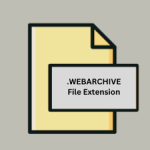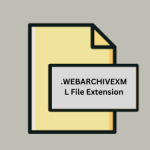.MASTER File Extension

What is an MASTER file?
The .MASTER file extension is primarily associated with ASP.NET Master Pages. These files are an integral part of the ASP.NET web development framework, designed to create a consistent layout across multiple web pages within a website.
Master Pages allow developers to define a template for the web pages, ensuring uniformity in design and structure, which can be efficiently managed and modified.
More Information.
The concept of Master Pages was introduced in ASP.NET 2.0, released in November 2005. The initial purpose was to address the common challenge of maintaining a consistent look and feel across an entire website.
Prior to Master Pages, developers had to duplicate layout code across multiple pages, which was not only time-consuming but also prone to errors and inconsistencies.
Master Pages resolved this by allowing a single template to control the structure and layout of multiple content pages, significantly improving the maintainability and scalability of web applications.
Origin Of This File.
The .MASTER file extension originated from the need for a more streamlined and efficient way to manage web page templates within the ASP.NET framework.
Developed by Microsoft, ASP.NET is a server-side web application framework designed for web development to produce dynamic web pages.
The introduction of Master Pages in ASP.NET 2.0 was a significant advancement, providing developers with a powerful tool to manage web page layouts systematically.
File Structure Technical Specification.
The .MASTER file itself is specific to ASP.NET and is not typically converted to other formats. If you need to migrate your web application to a different framework or technology, you would need to manually recreate the layout and design defined in the .MASTER file using the target framework’s templating system.
For example, if migrating to an MVC framework, you might convert the Master Page to a layout view in the new framework:
- ASP.NET MVC: Convert to a
_Layout.cshtmlfile. - Ruby on Rails: Convert to an
application.html.erbfile. - Django: Convert to a
base.htmlfile.
In each case, the process involves copying the static HTML content and server controls from the .MASTER file to the appropriate template file in the new framework and adapting any server-side code to the new framework’s syntax and conventions.
How to Convert the File?
Converting .MASTER files is typically not required since they are specific to the ASP.NET framework. If necessary, the layout and content can be extracted and adapted into other web development frameworks or static HTML files. Here are general steps to convert a .MASTER file to a static HTML file:
- Extract the HTML Markup: Copy the HTML markup from the .MASTER file.
- Replace Server Controls: Replace ASP.NET server controls (e.g.,
<asp:ContentPlaceHolder>) with appropriate HTML tags or placeholders. - Save as HTML: Save the modified file with an .html extension.
Advantages And Disadvantages.
Advantages:
- Consistency: Ensures a consistent look and feel across all web pages.
- Maintainability: Centralized layout management reduces redundancy and simplifies updates.
- Efficiency: Saves development time by reusing the same layout structure.
- Scalability: Easier to scale web applications as the layout changes can be managed from a single file.
Disadvantages:
- Complexity: Initial setup can be complex for beginners.
- Performance: Overhead in processing Master Pages might affect performance for very large websites.
- Flexibility: Limited flexibility as all content pages must adhere to the defined structure in the Master Page.
How to Open MASTER?
Open In Windows
- Microsoft Visual Studio: The primary IDE for ASP.NET development. Open the .MASTER file within an ASP.NET project.
- Visual Web Developer: A lightweight alternative to Visual Studio, also capable of handling .MASTER files.
Open In Linux
- MonoDevelop: An open-source IDE that supports ASP.NET development and can open .MASTER files.
- Text Editors: Similar to macOS, text editors like Sublime Text or Visual Studio Code can be used.
Open In MAC
- Visual Studio for Mac: Supports .MASTER files within ASP.NET projects.
- Text Editors: Use text editors like Sublime Text or Visual Studio Code with ASP.NET plugins for syntax highlighting.













